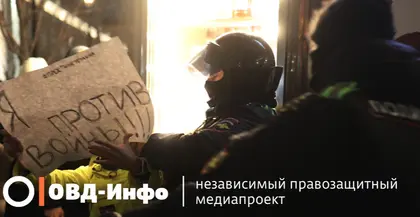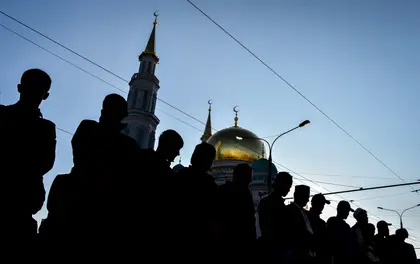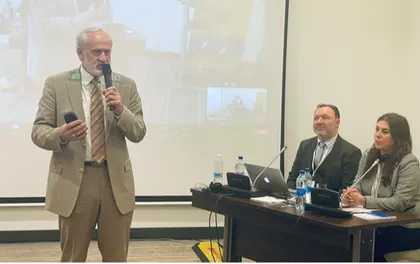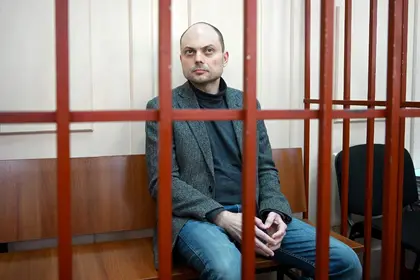Daria Korolenko, a representative of the OVD-Info human rights media project, shed light on the growing movement of anti-war activists and dissidents in Russia in a recent interview with Human Rights Without Frontiers (HRWF).
Despite the prevailing repression of the Russian people by the regime under Vladimir Putin, Korolenko revealed there is a significant number of Russians who hold dissenting opinions and disapprove of the way the government runs the country, particularly regarding the war in Ukraine.
JOIN US ON TELEGRAM
Follow our coverage of the war on the @Kyivpost_official.
OVD-IASnfo, founded in 2011, is a volunteer-driven project with close ties to the human rights organization Memorial which was founded during the fall of the Soviet Union with the, aim of investigating human rights violations.
Recently, however, Memorial's association with OVD-Info has led to legal complications. In December 2021, Memorial was declared a “Foreign Agent” by the Moscow City Court, under laws introduced in 2012, which effectively ended it as a legal entity in Russia.
On April 5, 2022, the Russian Court of Appeal confirmed the dissolution.
The Prosecutor’s Office demanded that Memorial register as a “foreign agent” because it receives funding from abroad in support of the OVD-Info project, which was categorized by the prosecutor as a political organization Daria said.
Nevertheless, the OVD-Info still operates in Russia in spite of these severe challenges and implications. The project focuses on exposing political persecution and providing legal assistance to those facing repression.
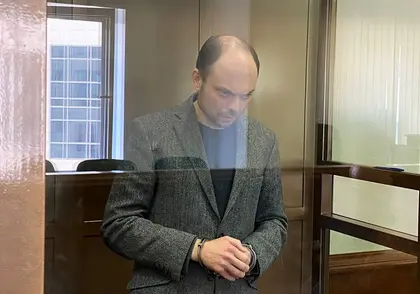
Kremlin Critic Kara-Murza Jailed for 25 Years
Korolenko detailed OVD-Info's ongoing struggle against state pressure, including the implications of being labelled as a “foreign agent” and blocking of its website.
“On 25 December 2021 Roskomnadzor [Russia’s communications, IT and media oversight agency] blocked the OVD-Info website on the grounds that it allegedly contained ‘propaganda of terrorism and extremism.’ The agency also demanded that social networks delete the project’s accounts. On the same day, the Yandex [web portal] removed the OVD-Info website from search results,” Daria recalled.
“In July 2022, the court decision to block the site was overturned. On June 2, 2023 Roskomnadzor again blocked the OVD-Info website, as well as all the websites of the media project, based on its ‘non-compliance’ with the law on foreign agents,” she added.
The project remains unregistered due to political persecution, operating underground to provide crucial legal assistance and disseminate information on politically motivated persecutions.
OVD-Info's database, which tracks politically motivated criminal prosecutions since 2012, reveals that over 3,415 individuals have been subjected to such prosecution, with almost 1,000 currently in detention.
The data highlights the increase in repression during the 20 months following the full-scale invasion of Ukraine, with 19,810 people detained at anti-war rallies and 772 defendants in criminal cases.
“According to our data, during the twenty months of the war in Ukraine, their number reached 19,810 people detained at anti-war rallies, with 772 defendants facing criminal cases, including minors and pensioners. And their number continues to grow,” Daria said.
The media project, funded primarily through crowdfunding from around 190,000 Russian donors, employs 400 lawyers, 7,000 volunteers, and operates round the clock to monitor and report on political persecution across Russia's 11 time zones.
OVD-Info also engages in public campaigns, providing legal assistance and publishing reports on various aspects of repression, including monthly summaries of anti-war repressions.
The organization's ultimate goal, according to Daria, is the cessation of political persecution in Russia. The project strives to develop civil society institutions, enhance public control over authorities, and safeguard freedom of assembly and expression for individuals of all views.
You can read the full interview here.
You can also highlight the text and press Ctrl + Enter


